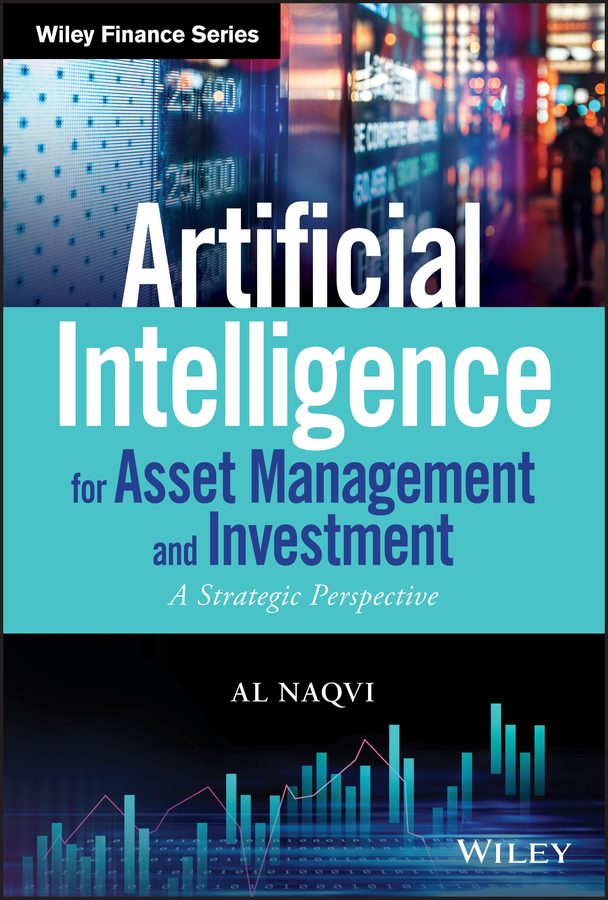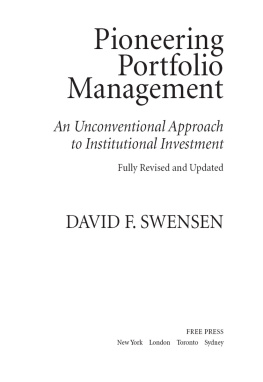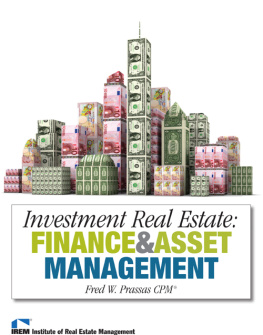Al Naqvi - Artificial Intelligence for Asset Management and Investment: A Strategic Perspective
Here you can read online Al Naqvi - Artificial Intelligence for Asset Management and Investment: A Strategic Perspective full text of the book (entire story) in english for free. Download pdf and epub, get meaning, cover and reviews about this ebook. year: 2021, genre: Business. Description of the work, (preface) as well as reviews are available. Best literature library LitArk.com created for fans of good reading and offers a wide selection of genres:
Romance novel
Science fiction
Adventure
Detective
Science
History
Home and family
Prose
Art
Politics
Computer
Non-fiction
Religion
Business
Children
Humor
Choose a favorite category and find really read worthwhile books. Enjoy immersion in the world of imagination, feel the emotions of the characters or learn something new for yourself, make an fascinating discovery.

Artificial Intelligence for Asset Management and Investment: A Strategic Perspective: summary, description and annotation
We offer to read an annotation, description, summary or preface (depends on what the author of the book "Artificial Intelligence for Asset Management and Investment: A Strategic Perspective" wrote himself). If you haven't found the necessary information about the book — write in the comments, we will try to find it.
Al Naqvi: author's other books
Who wrote Artificial Intelligence for Asset Management and Investment: A Strategic Perspective? Find out the surname, the name of the author of the book and a list of all author's works by series.
Artificial Intelligence for Asset Management and Investment: A Strategic Perspective — read online for free the complete book (whole text) full work
Below is the text of the book, divided by pages. System saving the place of the last page read, allows you to conveniently read the book "Artificial Intelligence for Asset Management and Investment: A Strategic Perspective" online for free, without having to search again every time where you left off. Put a bookmark, and you can go to the page where you finished reading at any time.
Font size:
Interval:
Bookmark:

- Chapter 3
- Chapter 5
- Chapter 14
- Chapter 1
- Chapter 3
- Chapter 5
- Chapter 6
- Chapter 7
- Chapter 9
- Chapter 18
- Chapter 19
Founded in 1807, John Wiley & Sons is the oldest independent publishing company in the United States. With offices in North America, Europe, Asia, and Australia, Wiley is globally committed to developing and marketing print and electronic products and services for our customers' professional and personal knowledge and understanding.
The Wiley Corporate F&A series provides information, tools, and insights to corporate professionals responsible for issues affecting the profitability of their company, from accounting and finance to internal controls and performance management.
AL NAQVI

Copyright 2021 by John Wiley & Sons, Inc. All rights reserved.
Published by John Wiley & Sons, Inc., Hoboken, New Jersey.
Published simultaneously in Canada.
No part of this publication may be reproduced, stored in a retrieval system, or transmitted in any form or by any means, electronic, mechanical, photocopying, recording, scanning, or otherwise, except as permitted under Section 107 or 108 of the 1976 United States Copyright Act, without either the prior written permission of the Publisher, or authorization through payment of the appropriate per-copy fee to the Copyright Clearance Center, Inc., 222 Rosewood Drive, Danvers, MA 01923, (978) 750-8400, fax (978) 646-8600, or on the Web at www.copyright.com. Requests to the Publisher for permission should be addressed to the Permissions Department, John Wiley & Sons, Inc., 111 River Street, Hoboken, NJ 07030, (201) 748-6011, fax (201) 748-6008, or online at www.wiley.com/go/permissions.
Limit of Liability/Disclaimer of Warranty: While the publisher and author have used their best efforts in preparing this book, they make no representations or warranties with respect to the accuracy or completeness of the contents of this book and specifically disclaim any implied warranties of merchantability or fitness for a particular purpose. No warranty may be created or extended by sales representatives or written sales materials. The advice and strategies contained herein may not be suitable for your situation. You should consult with a professional where appropriate. Neither the publisher nor author shall be liable for any loss of profit or any other commercial damages, including but not limited to special, incidental, consequential, or other damages.
For general information on our other products and services or for technical support, please contact our Customer Care Department within the United States at (800) 762-2974, outside the United States at (317) 572-3993, or fax (317) 572-4002.
Wiley publishes in a variety of print and electronic formats and by print-on-demand. Some material included with standard print versions of this book may not be included in e-books or in print-on-demand. If this book refers to media such as a CD or DVD that is not included in the version you purchased, you may download this material at http://booksupport.wiley.com. For more information about Wiley products, visit www.wiley.com.
Library of Congress Cataloging-in-Publication Data:
Names: Naqvi, Al, author. | John Wiley & Sons, Inc., publisher.
Title: Artificial intelligence for asset management and investment : a strategic perspective / Al Naqvi.
Description: Hoboken, New Jersey : John Wiley & Sons, Inc., [2021] | Series: Wiley finance series | Includes index.
Identifiers: LCCN 2020029614 (print) | LCCN 2020029615 (ebook) | ISBN 9781119601821 (hardback) | ISBN 9781119601876 (adobe pdf) | ISBN 9781119601845 (epub)
Subjects: LCSH: Asset allocation. | Artificial intelligence. | Financial services industryTechnological innovations.
Classification: LCC HG4529.5 .N366 2021 (print) | LCC HG4529.5 (ebook) | DDC 332.60285/63dc23
LC record available at https://lccn.loc.gov/2020029614
LC ebook record available at https://lccn.loc.gov/2020029615
Cover Design: Wiley
Cover Image: katjen/Shutterstock, whiteMocca/Shutterstock
For Shakila
ARE YOU SEEKING A BOOK on artificial intelligence (AI) in finance? Good news and not so good news. Good news is that you are likely to find many books; bad news is that most of those are written by quants and for quants. Riddled with complex math equations, proofs, and theorems, these books speak a language that many people do not understand.
It is as if authors want to demonstrate how much they know about machine learning but not tell you what you need to know. The tone is often ridiculing, even insulting, as if each sentence is coded language to discourage nonmembers from entering the exclusive club of AI. In some cases, the tone is demeaning toward even other quants, with the connotation of you don't know, we know position. The subtle undertone is clear: if you do not understand complex math and data science, you do not deserve to enter the amazing world of AI. This esoteric, closed, and limited membership in AI is problematic at many levels.
If you have not spent decades in the investment world and you talk to some hardcore finance professionals, they will remind you that if you are an experienced data scientist, then you don't belong in the industry. You will be labeled as too naive or too young or too inexperienced. If you are an expert in deep learning and reinforcement learning, they will tell you that you have no use in the finance world. They will argue that deep learning and reinforcement learning are not being extensively used in finance (what they are really saying is that they are not using these models, and they have not seen those being widely used in practice). This criticism of machine learning professionals can be viewed as a mix of some reality and a bit of fear of the unknown.
Do not get me wrong. Certain authors are well-meaning and direct. They point out the gaps and show how to close them. They recognize that one must be blunt and direct to show the weaknesses. For instance, De Prado's approach is a passionate wake-up call for many quant organizations, and I am confident his work saved billions of dollars and avoided many unnecessary catastrophes (De Prado, Advances in Financial Machine Learning, Wiley 2018). I am referring to those who point out problems but never provide solutions.
It is true that finance machine learning is different. The signal-to-noise ratio is low. You are dealing with a dynamic and constantly changing system. Your every action is under scrutiny. You are dealing with significant amounts of unstructured data. You could be identifying relationships and then trying to discover the theory of attempting to explain what is transpiring. Many interesting finds are prone to overfitting. You are operating in an environment that is not only constantly changingyour interaction with it is exposing your strategy, and hence your strategy is subject to constant reinvention.
Now come to the non-quant consulting club. There are several people who are trivializing AI. This is the hype club that opens every AI conversation with a vague, astrology-styled notion of future of work, and the next words in those conversations are almost always deep learning, AlphaGo, and IBM AI winning the
Next pageFont size:
Interval:
Bookmark:
Similar books «Artificial Intelligence for Asset Management and Investment: A Strategic Perspective»
Look at similar books to Artificial Intelligence for Asset Management and Investment: A Strategic Perspective. We have selected literature similar in name and meaning in the hope of providing readers with more options to find new, interesting, not yet read works.
Discussion, reviews of the book Artificial Intelligence for Asset Management and Investment: A Strategic Perspective and just readers' own opinions. Leave your comments, write what you think about the work, its meaning or the main characters. Specify what exactly you liked and what you didn't like, and why you think so.







